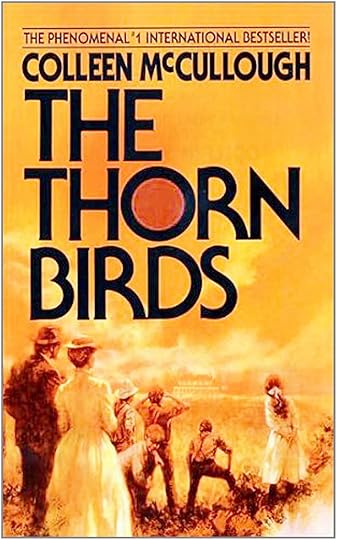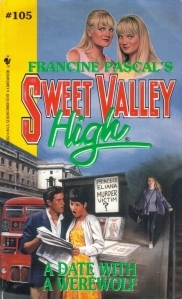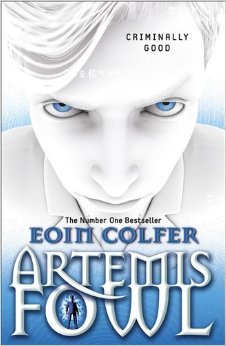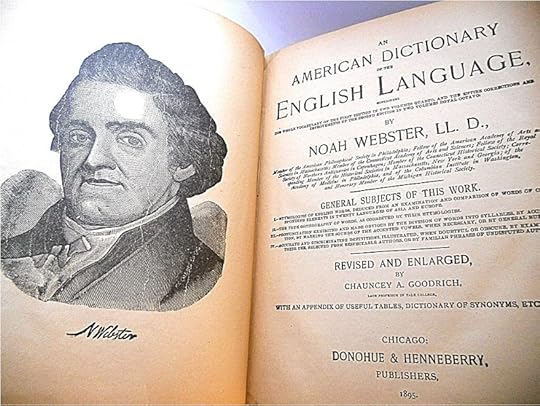Hannah Kate's Blog, page 73
August 24, 2015
Guilty Pleasures!
On Saturday 1st August, Hannah’s Bookshelf was all about guilty pleasures – the books we love, even though we know they’re not quite Literature-with-a-Capital-L. As promised, this post includes a list of all the books I talked about in the show. And yes – they are all recommendations. In fact, as the show went on I started to get cross with myself for even calling them ‘guilty’ pleasures – I don’t feel guilty at all for enjoying these books!
I started off the show by talking a bit about the history of ‘guilty’ reading pleasures, and the type of books that we’re told we ‘shouldn’t’ read if we want to be taken seriously. Jane Austen’s Northanger Abbey has a heroine (Catherine Morland) who engages in such ‘guilty’ reading, and the book includes a list of seven ‘horrid’ novels that many readers believed were so sensational, they must be Austen’s own invention. Catherine’s horrid novels were not fictional, though, as the titles were tracked down and republished in the 1960s.
The novels are: Castle of Wolfenbach (by Eliza Parsons); Clermont (by Regina Maria Roche); The Mysterious Warning, a German Tale (by Eliza Parsons); The Necromancer; or, The Tale of the Black Forest (by ‘Ludwig Flammenberg’); The Midnight Bell (by Francis Lathom); The Orphan of the Rhine (by Eleanor Sleath); Horrid Mysteries (by the Marquis de Grosse). The first six titles are available in modern editions from Valancourt Books, with Horrid Mysteries due to be released later this year.
Next up, I talked about the titles on my own guilty pleasures reading list. As I said, I don’t actually feel guilty about liking these books. They are all titles I enjoyed reading and, in some cases, rereading. If you’d like to hear more about these books and why I chose them for this list, you can listen again to the show on the player at the bottom of this post. And don’t forget to leave your comments – or your own selections – as well!
The Thorn Birds by Colleen McCullough
Set on a sheep station in the Australian outback, Colleen McCullough’s 1977 bestseller isn’t the sort of thing I normally read. But I can’t deny it – I was absolutely hooked from the first chapter. And yes – I did cry. Several times.
I had a peculiar fascination with the Sweet Valley High series (created by Francine Pascal in 1983) as a pre-teen, and read many, many of the novels. I also read quite a few of the Sweet Valley Twins spin-off series as well. The cover shown here is from A Date With a Werewolf, part of the Horror in London mini-series, and you can read my more detailed blog post about this title here. As I mentioned on the show, one of the ghostwriters who worked on the series, Amy Boesky, has written a fascinating account of her time as a Sweet Valley High writer, which you can read here.
The Morganville Vampires by Rachel Caine
What guilty pleasures list would be complete without a few vampires? Rachel Caine’s Morganville series (2006-2014) are, in my humble opinion, the best YA vampire books out there. Beginning with Glass Houses, the series has 15 books about Claire Danvers adventures in the vampire-run town of Morganville. I love this series so much that I haven’t yet read the last two books (Fall of Night and Daylighters), because I’m saving them as a treat. Oh – and I’m totally Team Myrnin.
The Artemis Fowl series by Eoin Colfer
Again, really not feeling very guilty for liking this one! Colfer’s series (2001-2012) about twisted young genius Artemis Fowl are often overlooked in favour of a certain boy wizard, and that seems like a crime to me. Described by the author as ‘Die Hard with fairies’, the eight Artemis Fowl books are a rattling trip through a biotech fairy realm, megalomaniac pixies, time travel, demon dimensions and mind control. But there’s a fair bit about friendship, family, growing up and loss in there too. My favourite in the series is The Opal Deception but only narrowly, as they’re all awesome.
To find out more about my guilty pleasures reading list – and my thoughts on why we describe some books as ‘guilty’ pleasures (as well as the problems of that definition) – you can listen again to the show here:
Hannah’s Bookshelf 01/08/15 by Hannah’s Bookshelf on Mixcloud
The post Guilty Pleasures! appeared first on Hannah Kate.
July 29, 2015
North Manchester FM: Hannah’s Bookshelf Catch-Up
Here are a couple of recent shows you might have missed. I meant to share the links sooner, but time seems to have run away with me… again. Feel free to leave your comments below – and let me know if you need any further details about any of the books discussed in the shows.
Experimental Fiction (16 May)
I talk about experimental fiction – particularly anti-novels – and the reasons why I enjoy reading it. I also share some of my favourite experimental fiction (including one possibly controversial choice).
Hannah’s Bookshelf 16/05/15 by Hannah’s Bookshelf on Mixcloud
Arthurian Literature (20 June)
As I was getting ready to head off to the Glastonbury festival, I devoted this show to talking about some of my favourite Arthurian literature. Beginning with a (very brief) run-down of the historical basis for King Arthur, I talked about medieval chronicle and romance, and the rise of the Knights of the Round Table.
Hannah’s Bookshelf 20/06/15 by Hannah’s Bookshelf on Mixcloud
Film Adaptations – with special guest Rob Shedwick (11 July)
Me and my other half talk about some of our favourite book-to-film adaptations, including recent adaptations of graphic novels. We also give a bit of thought to the good, the bad and the ugly of film-to-book adaptations and tie-ins.
Hannah’s Bookshelf 11/07/15 – with special guest Rob Shedwick by Hannah’s Bookshelf on Mixcloud
Prequels, Sequels, First Drafts and Perspective Flips (18 July)
Inspired by the publication of Go Set a Watchman, this week’s show is all about ‘other versions’ of classic and popular literature. I talk about what happens when another writer pens a sequel or prequel to a much-loved book, giving a run-down of some of the best examples (and one of the absolute worst). I also talk about the current obsession with first drafts and ponder the effect of seeing familiar characters from a new perspective.
Hannah’s Bookshelf 18/07/15 by Hannah’s Bookshelf on Mixcloud
The post North Manchester FM: Hannah’s Bookshelf Catch-Up appeared first on Hannah Kate.
July 24, 2015
North Manchester FM: Hannah’s Bookshelf, Saturday 25 July, 4-6pm
Join me on Saturday, 4-6pm, for Hannah’s Bookshelf on North Manchester 106.6FM. My guest this week is the wonderful Rosie Garland.
From singing with post-punk gothic band The March Violets, to performing as her beautifully subversive (and subversively beautiful) alter-ego Rosie Lugosi, and winning numerous awards (including the DaDa award for Performance Artist of the Year), Rosie’s career has been wide-ranging and eclectic. In 2012, she won the Mslexia novel competition and her acclaimed debut novel, The Palace of Curiosities, was published by HarperCollins in 2013. Her second novel, Vixen, was published the following year. Rosie has also published a number of poetry collections, including Everything Must Go (Holland Park Press, 2012) and Things I Did While I Was Dead (Flapjack Press, 2010).
I’m really excited to be welcoming Rosie onto the show this week. She is a writer I respect enormously (for so many reasons), so I’m looking forward to chatting to her about her writing and career. And, of course, Rosie will be giving me her unique take on the Apocalypse Books section of the show.
Tune in at 4pm on Saturday – 106.6FM if you’re in the North Manchester area, listen online if you’re anywhere else. And if you’d like to join in the conversation, you can text in on 07757 083438 or tweet @HannahKateish during the show.
The post North Manchester FM: Hannah’s Bookshelf, Saturday 25 July, 4-6pm appeared first on Hannah Kate.
July 14, 2015
In Defence of -ize
Right, I think I’ll get myself organized and post something I’ve been meaning to write for a while.
Readers in the UK – did anything about that sentence irritate you? Was there an innocuous little letter in there that made you wrinkle your nose? Maybe made you grumble about Americanization? Oh no! There it was again!
There are a large number of people in the UK (and, I believe, in Ireland and Australia) who would place ‘organize’ in the same category as ‘color’ and ‘theater’: American spellings that should be avoided at all costs by writers of British (and Australian) English. For some, the -ize ending is simply inappropriate: the z should be politely replaced by an s with all the speed of adding a u or flipping an r and an e. For others – and I’m really sorry to all my friends who fall into this category – the -ize suffix is an irritant to rival only the greengrocer’s apostrophe. I have seen people physically shudder on seeing the word ‘realization’, holding up their copy of Eats, Shoots and Leaves as if to ward off evil.
For you see, when I write I favour the -ize suffix for certain words. You might not notice this in the work I’ve had published, as this conforms to various publishers’ style sheets – and most of the UK publishers I have worked with favour -ise. In the work I have published myself (as editor-in-chief of Hic Dragones), I have allowed short story authors to choose their own suffix (as long as it’s consistent), but bowed to peer pressure and favoured -ise in novels written in UK English. But in my blog posts, tweets, emails, texts and forum posts, you’ll regularly find ‘realize’, ‘organize’ and ‘civilize’. And as I’ve been criticized for this in the past, and even called upon to apologize, please consider this post an explanation of my spelling choices.
Contrary to what you might think, I am not a Grammar Nazi. I do work as an editor and English tutor, and I do have a PhD in English Literature. But I don’t wince at misplaced punctuation. I don’t cry at every ‘could of’ and ‘would of’. Yes – I underline it in red in a pupil’s homework, but that’s only because it’s my job to do that. If I’m not being paid to point out errors, have at it.
But although I’m generally fairly laissez-faire about typos and bad grammar, I love words. I love understanding etymologies and language, and – most importantly – I love the cultural history of words. Discovering how a word’s usage, spelling and meaning has changed over time reveals intricate and complex stories about how individuals and nations have interacted with each other throughout time, how priorities, mores and habits have altered, and how the development of various technologies has intersected with the constant evolution of interpersonal communication. Delving into the reason why Americans tend to say ‘erb’, where the UK prefers ‘herb’ (except those of us who drop our aitches/haitches) opens you up to a story that takes in the very formation of the USA. Entering the debate about the shifting meaning of the word ‘gay’ forces you to confront issues of authority, definition and identification. This is what I love about words.
Not to mention, of course, that I’m a medievalist by training. It’s impossible to study medieval literature and retain any adherence to strict rules of grammar and spelling. That’s not to say medievalists just chuck the dictionary out the window and pretend that modern rules of written communication don’t exist, but rather that familiarity with Middle and early modern English makes you realize just how recent (and, in some cases, arbitrary) these dictionaries and rules are.
Okay, so let’s have a look at -ize.
Nowadays (a lovely fourteenth-century word that, while seemingly simply referring to the present, almost always indicates a consideration of the past), there are 3 dominant ways of dealing with words that rhyme with ‘eyes’.
The US -ize ending.
Transitive verbs formed from a noun that has come down from Greek or has been adopted at some point from Greek, and which have the meanings ‘make or conform to [noun]’ or ‘treat in the way of [noun]’ take the suffix -ize (e.g. ‘organize’, ‘realize’). Words formed from later sources, but which mimic the formation of words taken from Greek sources, take the -ize suffix (e.g. ‘womanize’, ‘pedestrianize’). The words ‘paralyze’ and ‘analyze’ are spelt with a z. However, words in which -ise is part of a longer element (such as ‘cise’ or ‘prise’) are spelt with an s (e.g. ‘surprise’, ‘circumcise’).
The UK -ize ending.
As above; however, the words ‘paralyse’ and ‘analyse’ are more usually spelt with an s.
The UK -ise ending.
All the above types of words are spelt with an s.
As I’m talking about UK spelling today, I’m going to put no. 1 to one side for a moment, and consider the variations in spellings found in the UK.
First thing’s first, they are both correct. Today, the majority of publishers use no. 3, but there are still publishers (most notably Oxford University Press) who prefer no. 2. The Oxford English Dictionary lists ‘realize’ as the primary spelling (with ‘realise’ as a variant), but most other British English dictionaries list the opposite. In my experience, schoolchildren are most commonly taught to use -ise; however, most people of my acquaintance with some classical training or experience of publishing in the hard sciences will tend towards the -ize suffix. But for personal communication, either no. 2 or no. 3 is thoroughly British and appropriate.
The people who insist that -ize is American and has somehow ‘infiltrated’ British English are incorrect, though. And while I might not bother about a misplaced apostrophe, I am awfully protective of my -izes.
The history of the -ize suffix is complex one, but I’m going to try and make it brief here. There are some excellent detailed discussions of the suffix on the web – for instance, this incredibly thorough study of usage and history and this succinct explanation of the background to modern spelling choices. If you have access to the OED, there’s an etymological explanation of the suffix that includes some notable citations.
Here’s a quick summary… verbs of the type being discussed here are found in Greek (some are transitive, some intransitive) and are formed by adding the suffix -ίζειν. When these words were Latinized, they took the suffix -izāre. In the later Middle Ages, some of these words entered Old French and then Middle English (some via Old French, some direct from Latin) with the suffixes -iser and -isen respectively. And it’s here that our controversy begins…
The reason why Old French formed verbs with the -iser suffix is because the letter z as we now know it (call it zed or zee or izzard, I don’t mind) wasn’t used in the same way as it is now. The same was true for Middle English – which used s for voiced and unvoiced sibilants alike, and had z as a work-in-progress. The letter came into its own in later centuries as a) the voiced sibilant; b) combined with a t for the Anglo-Norman z in words such as ‘fiz’ (which became ‘fitz’ in English, but is pronounced with a ts sound); c) as a double consonant to represent a sibilant humming sound, replacing earlier spellings with a single or double s, presumably (and I could be wrong here) to emphasize the onomatopoeic qualities of words such as ‘buzz’ and ‘fizz’. These uses of the letter z kind of explode in early modern English, so much so that Shakespeare’s King Lear turned the poor letter z into an insult:
Thou whoreson zed! thou unnecessary letter!
Around the middle of the fifteenth century, the use of z for the voiced sibilant took over from the use of s – even for words which are now uniformly spelt with an s. For example, Shakespeare (in Sonnet 102) uses the very modern sounding ‘merchandized’, and Milton includes both ‘enterprize’ and ‘surprize’ in his work. ‘Buzz’ and ‘fizz’ acquired their second zeds around the seventeenth century – kissing goodbye to ‘bussing’ and ‘fyseling’.
So why the z-frenzy? The rise of the use of the letter z for the voiced sibilant occurs at a time when the English language was being ‘cleaned up’ and regularized. With the adoption of Chancery Standard (London English) as a linguistic and literary standard and the invention of the printing press in the fifteenth century, and the production of ‘official’ English-language bibles in the sixteenth and early seventeenth centuries, the ‘rules’ of grammar and spelling were beginning to be formed. And zed had some powerful allies – for instance, Caxton used z to represent the voiced sibilant in his early printed works, and later Shakespeare and the King James Bible would favour the -ize suffix.
In terms of the transitive verbs that are my concern here, there may have been another consideration. The ‘renaissance’ of classical learning saw a general trend towards acknowledging the Greek and Latin roots of English words. Now that z was once again available, it was reinserted into words such as ‘authorize’ (which had entered English in the fourteenth century with the -ise suffix) and used in newly coined verbs such as ‘civilize’ and ‘organize’. The -ize suffix revealed the words’ Greek-via-Latin roots and simultaneously distanced them from French. I have no idea how important the latter point was, but it’s tempting to presume that the formation of a national language – one that would very soon be imposed on vast swathes of the globe in the name of Empire – would involve some rejection of an earlier authoritative language. By spelling ‘authorize’ with a z, early modern Grammar Nazis could easily convince themselves the word had come straight to English from Latin, and conveniently erase the Old French ‘autoriser’.
Now, although early modern English was far more standardized than Middle English, it was still pretty lax when compared to today’s obsession with grammar. Milton did indeed use ‘surprize’ in Paradise Lost, but other writers of the time preferred ‘surprise’. There are numerous other examples of this uncertainty to be found in works from the seventeenth and eighteenth centuries, and many key examples (include Johnson, Sterne and Swift) are discussed in this blog post. It seems that, throughout the early modern period, the -ize suffix had the upper hand and the -ise was a less common, but persistent, variant.
During this time, of course, something was happening on the other side of the Atlantic. The creation of American English had begun – and that is a whole other story. For the purposes of this post, two important features of North American English are that a) it is, on the whole, more consistent than British English (i.e. where British English has variant spellings, standard US English tends to have one ‘correct’ spelling); b) some archaic features are retained in US English but have disappeared in British English (though, obviously, the opposite is also sometimes true). So standard US English still has a silent h at the beginning of ‘herb’ and uses ‘fall’ instead of ‘autumn’ (sorry UK readers… ‘fall’ isn’t an Americanism, it’s just a more poetic (but now obsolete) British word for the season when leaves fall).
The codification of US English owes a lot to Noah Webster, lexicographer and spelling reformer, who had some pretty definitive views about how words should be written.
Webster’s rules on spelling and grammar were austere and prescriptive and tended to tie down ambiguities and inconsistencies. When it came to the -ize ending, Webster was characteristically firm: the -ize suffix, deriving as it does from Greek-via-Latin, was etymologically correct. This reasoning also held true for ‘paralyze’ and ‘analyze’; however, words in which -ise formed part of a longer word element where the Latin root does not contain a letter z (e.g. ‘surprise’ from the past participle of superprendĕre and ‘excise’ from Latin participial stem excīs-) should be spelt with -ise. Webster’s system was clear and logical, and standard US spelling has followed it ever since (with an occasional wobble with ‘advertise’, which should be spelt with an s on both sides of the pond as it is derived from the lengthened stem of the Anglo-Norman verb ‘avertir’, rather than from a Greek root, but sometimes acquires a whoreson zed in the US).
While the American -ize/-ise distinction was tidied up and codified by Webster and his successors, Britain continued on with its somewhat haphazard habits. In the nineteenth century, the worm began to turn and -ise began to reassert itself. Again, this coincided with both a general drive to ‘tidy up’ the somewhat higgledy-piggledy English language and the introduction of new technologies. Just as the invention of the printing press played a role in the standardization of spelling and grammar, the industrialization of the printing process and the rise of commercial publishers furthered the move towards a consistent(ish) set of spelling rules. This was the age of Henry Alford insisting that it is wrong to ever split an infinitive, and of Robert Lowth stating that a preposition is a bad thing to end a sentence on.
What’s strange, though, is that while late eighteenth- and early nineteenth-century grammar rules almost invariably looked to classical languages for their authority – e.g. infinitives should not be split in English because they can’t be split in Latin – the non-Latinate -ise suffix grew in popularity. To me, it feels like split infinitives and -ize endings have a lot in common, and yet it was during the reign of Victorian grammarians that -ise returned to dominance.
I don’t have an answer as to why that might be. It could simply be that tastes change. Or that a particularly influential publisher favoured the -ise ending and others followed suit. It has been argued that the relative rarity of verbs like ‘organize’ and ‘realize’ before the nineteenth century means that the issue had probably not arisen in earlier centuries. With the explosion of literacy and commercial publication, including – shock! horror! – the rise of writers and publishers who had not had a thorough grounding in Greek and Latin, people simply chose the spelling that made most sense (so ‘organise’ sounds like ‘surprise’, and so is spelt the same way). I’m not completely convinced of this, though. For one thing, while ‘organize’ and ‘realize’ were relatively uncommon words before the nineteenth century, ‘baptize’, one of the few (perhaps the only) verb of this sort to be found in the bible, was not. And, in the King James Version, ‘baptize’ is spelt with a z – why model ‘organize’ after ‘surprise’ and not ‘baptize’? Also, the popular presses of the early Victorian period, such as Edward Lloyd’s various publishing ventures, showed no such assumption of the ‘correctness’ of the -ise suffix. In the penny dreadfuls I’ve been editing recently, there is no strict adherence to one suffix over the other; you can even find variant spellings within the same text. I have yet to do a proper count of the suffixes in the Lloyd publications I’ve transcribed so far, but I think (from memory) the -izes just about have it.
So why did Dickens prefer -ise then? Why the resurgence of the pre-zed form? I have a hypothesis, though I would really love to hear from someone with more grounding in this than me. The period in which the -ise suffix emerges as dominant was one of social mobility and associated anxieties. It is fairly well-established that the emergent rich middle classes of the Victorian period sought to appropriate and recreate traditionally aristocratic cultural spheres as their own – and language was a big part of this. I’d hazard a guess that the rich middle classes cared a lot more about splitting infinitives than the aristocracy – just as today I’m sure Kate Middleton worries a lot more about accidentally dropping an aitch than Prince William does.
Obsessed as we are with class, the British have a number of bizarre little social shibboleths hidden in our everyday language, waiting to reveal the unwary social climber. One of the best known of these is the serviette/napkin distinction. The truly well-bred will only ever use a napkin; the vulgar person with ideas above their station has a serviette. The trick being played here is that ‘napkin’ looks more common, with its Germanic diminutive suffix and its close relationship to nappy and apron. But ‘serviette’ (while existing in an older form in Scots) was introduced in its current form as a French loan word in the nineteenth century. While the upper classes have retained their proprietorial hold over napkins, the aspirational nouveau riche were won over by the foreign chic of serviettes. (Why this distinction still holds today, I have no idea. But, if you ever go for tea with the queen, try to avoid asking for a serviette.)
I wonder if the rise of the -ise suffix, which occurs at exactly the same time as the middle classes began dabbing their lips with serviettes, might be due to similar factors. Although someone with a classical education might tell you that -ize is the correct form, to the newly wealthy man-about-town -ise looks posher because, just like ‘serviette’, it’s French. And for anyone aspiring to be accepted by the beau monde or the haut ton, French seems like the way to do it. As I say, I would love to hear from anyone who could confirm or refute this hypothesis.
Into the twentieth century, the -ise suffix continued its return to dominance. Some dissenters argued for the correctness of -ize (most notably Henry Fowler in his Dictionary of Modern English Usage), and several major publishers resisted the shift for as long as they could (The Times made the switch to -ise relatively late, for example). The last real bastion of the -ize suffix is, as I’ve said, Oxford University Press and the Oxford English Dictionary – to the point where it is perhaps more appropriate to call this spelling pattern the ‘Oxford -ize’. One of my favourite little -ize moments is to be found in an episode of Inspector Morse, where the detective solves a murder based on the fact that ‘an Oxford man’ would never use the -ise suffix.
The adoption of -ise by the British press, and by both popular and academic publishers, has led to the current widely-held assumption that this is the traditional British spelling. It is the -ise suffix that is taught in schools, and it is the -ize suffix that is corrected because it is ‘American’. There is merit in this shift though. The UK -ise spelling pattern is much, much easier. You don’t need to know and remember the etymological difference between ‘surprise’ and ‘baptise’, or between ‘advertise’ and ‘exorcise’, in order to spell them. In many ways, the -ise suffix is far less elitist and is more conducive to universal literacy. When you have Oxford University Press and Inspector Morse on the one hand, and the entirety of the British press and commercial publishing outlets on the other, it’s clear to see which suffix belongs to those in an ivory tower and which belongs to those who wish to communicate with the general public.
So why do I use -ize?
I dislike elitism, and I embrace linguistic changes brought about by increased access to publishing and literacy. So why use a suffix that belongs to the most ivory of all towers? I hate the Oxford (or Harvard) comma (another supposed Americanism that is beloved by OUP, but not by any other UK publishers). And don’t get me wrong: I’m happy to use -ise when I have to, and you’ll never ever see a comment from me along the lines of ‘well, actually, the word is formed from a Greek root and so the correct form should be ‘organize’. I correct people who call my spelling American (I can’t help that), but I don’t correct ‘civilisations’ and ‘realisations’.
As I said before, I love words. I love them the way the owner of a classic car loves their vehicle. Yeah, I like to drive them. And yeah, sometimes I think I look cool driving them. But I also like to know how they work. I like to tinker with the engine and understand how everything fits together.
And for me, the -ize suffix is one of the finest linguistic experiences you can have. Opening the ‘-ize or -ise’ can of worms reveals a story that takes in Greek, Latin, Old French and Middle English, Chancery Standard, the history of the letter z, the formation and codification of American English, the shifting relationship of English to French, the invention of the printing press, the industrialization of the printing process, the rise of the educated middle classes, the drive towards universal literacy. And, by using the post-eighteenth-century convention of -ize but -yse (which has absolutely no etymological authority), you can keep hold of a sense of English’s higgledy-piggledyness and the fact that standardized spelling is really a very new and somewhat arbitrary invention. Every time you remember that surprise has an s but authorize has a z, you invoke the ghosts (nice word, rumour has it Caxton added the h because he decided it would be better if it conformed to Flemish spelling patterns) of past linguistic and cultural shifts. Every time you remember that ‘paralyse’ has an s but ‘apologize’ has a z, you raise the playful spectres of variant spellings that are so characteristic of the English language. And, of course, next time you see someone from the US spell ‘analyze’ with a z, remember that the spelling is symbolic of American independence.
So, in a nutshell, I love the UK -ize spelling because it’s a microcosm of the English language itself. And that’s the reason I use it.
(I also write ‘octopuses’ rather than ‘octopi’, but that, my friends, is a different story…)
July 7, 2015
WIN Gothic Fiction and Exclusive Penny Bloods Keyrings
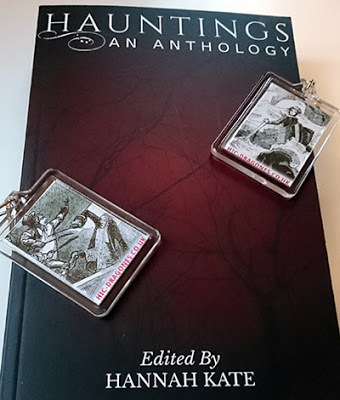
New competition from Hic Dragones and Digital Periodicals – win a copy of Hauntings: An Anthology plus two of our exclusive penny blood keyrings.
Hauntings: An Anthology, edited by Hannah Kate
A memory, a spectre, a feeling of regret, a sense of déjà vu, ghosts, machines, something you can’t quite put your finger on, a dark double, the long shadow of illness, your past, a nation’s past, your doppelgänger, a place, a song, a half-remembered rhyme, guilt, trauma, doubt, a shape at the corner of your eye, the future, the dead, the undead, the living, a grey cat, a black dog, a ticking clock, someone you used to know, someone you used to be.
We are all haunted.
Twenty-one tales of the uncanny, by:
Rachel Halsall, Brandy Schillace, Allen Ashley, Hannah Kate, Audrey Williams, James Everington, David Webb, Sarah Peploe, Michael Hitchins, Patrick Lacey, Tracy Fahey, Rue Karney, Keris McDonald, Guy Burtenshaw, B.E. Scully, Mark Forshaw, Stewart Pringle, Daisy Black, Mere Joyce, Jeanette Greaves, and Elisabeth Brander.
Exclusive Digital Periodicals keyrings feature illustrations from Varney, the Vampyre and Angelina; or, the Mysteries of St Mark’s Abbey.
Enter via the Rafflecopter widget below.
July 4, 2015
North Manchester FM: Hannah’s Bookshelf, Saturday 4 July, 4-6pm
Join me on Saturday, 4-6pm, for Hannah’s Bookshelf on North Manchester 106.6 FM.
My guest this week will be the wonderful Simon Bestwick. Described by Ramsey Campbell as being ‘among the most important writers of contemporary British horror’, Simon is the author of two novels, three collections, and numerous short stories and novellas. Simon’s novel The Faceless is one of the few books to actually give me genuine nightmares (which is, of course, a good thing). You should also check out Simon’s excellent story ‘Trading Flesh’ in the Impossible Spaces anthology (published by Hic Dragones and edited by me).
Simon will be talking to me about writing, horror and more – and he’ll be sharing his Apocalypse Books selections as well. Tune in to 106.6FM (if you’re in the North Manchester area) or listen online if you’re further afield.
June 12, 2015
North Manchester FM: Hannah’s Bookshelf, Saturday 13th June, 4-6pm
Join me on Saturday at 4pm for Hannah’s Bookshelf on North Manchester 106.6FM. My guest this week will be Mike Whalley. Mike is a freelance journalist who writes for BBC Sport and ESPN, and who occasionally edits the Daily Star’s Text Maniacs page. He has had comedy sketches broadcast on Radio Four and Radio Four Extra, and is a long-term member of Manchester’s Monday Night Group, co-editing their 2014 anthology No More Chairs.
Mike and I will be chatting about writing, the Monday Night Group and Manchester’s writing scene. And, of course, Mike will be sharing his Apocalypse Books selections.
Tune in on Saturday at 4pm – 106.6FM if you’re in the North Manchester area, listen online if you’re further afield.
June 4, 2015
North Manchester FM: Hannah’s Bookshelf, Saturday 6 June, 4-6pm
Join me this week for Hannah’s Bookshelf on North Manchester FM. This week, I’ll be joined by horror author Cate Gardner. Cate – who has been described by Publishers Weekly as ‘a rising purveyor of high literary strangeness’ – is the author of over a hundred short stories, four novellas and two chapbooks. Her short story collection, Strange Men in Pinstripe Suits (published by Strange Publications) has been described as being ‘like watching The Twilight Zone, hosted by Franz Kafka, with adaptations by Lewis Carroll’, and her novella Theatre of Curious Acts is a darkly quirky tale of the End of Days. Regular listeners of the show will probably recognize that these are definitely a few of my favourite things!
It probably goes without saying that Cate will be sharing her Apocalypse Books selections, but we’ll also be chatting about writing, publishing and the darker side of fiction.
Hannah’s Bookshelf is on North Manchester FM on Saturday, 4-6pm. It’s 106.6FM if you’re in the area, but you can listen online if you’re not.
May 29, 2015
North Manchester FM: Hannah’s Bookshelf, Saturday 30 May, 4-6pm
Join me this Saturday, 4-6pm, for Hannah’s Bookshelf on North Manchester FM. My guest this week will be Emma Marigliano, librarian at the Portico Library.
One of Manchester’s hidden gems, the Portico can be found on Mosley Street (above The Bank pub, with an entrance on Charlotte Street). The library was built in the early 1800s and was opened in 1806 as a newsroom and subscription library. Still going strong over 200 years later, the library has an exhibition space, reading room and glorious domed ceiling. Emma will be talking a bit about the history of the Portico, but also what the library has to offer today (including upcoming events and the Portico Prize). And, hopefully, Emma will be sharing her Apocalypse Books selections.
So tune in to Hannah’s Bookshelf at 4pm – 106.6FM if you’re in the area, listen online if you’re not.
May 22, 2015
North Manchester FM: Hannah’s Bookshelf, Saturday 23 May, 4-6pm
Join me at 4pm tomorrow for Hannah’s Bookshelf on North Manchester 106.6FM. My guest this week will be Tony Walsh, renowned performance poet, writer and poetry teacher. We’ll be talking about poetry and the Manchester writing scene, as well as chatting about Tony’s fantastic book Sex & Love & Rock&Roll.
Tony’s work has been called ‘absolutely beautiful’ by Cerys Matthews and ‘fabulous stuff’ by Irving Welsh. He has been commissioned to write poems commemorating (among other things) Alex Ferguson’s retirement, the Great Manchester Run and Manchester Derby matches. Most recently, he has written ‘We Are Manchester’, a poem to mark the twentieth anniversary of the Manchester Arena, which is currently displayed at the Arena for ticket-holders and acts to see.
Catch Hannah’s Bookshelf this Saturday, 4-6pm, on North Manchester FM: tune into 106.6FM (if you’re in the area) or listen online (if you’re further afield).


